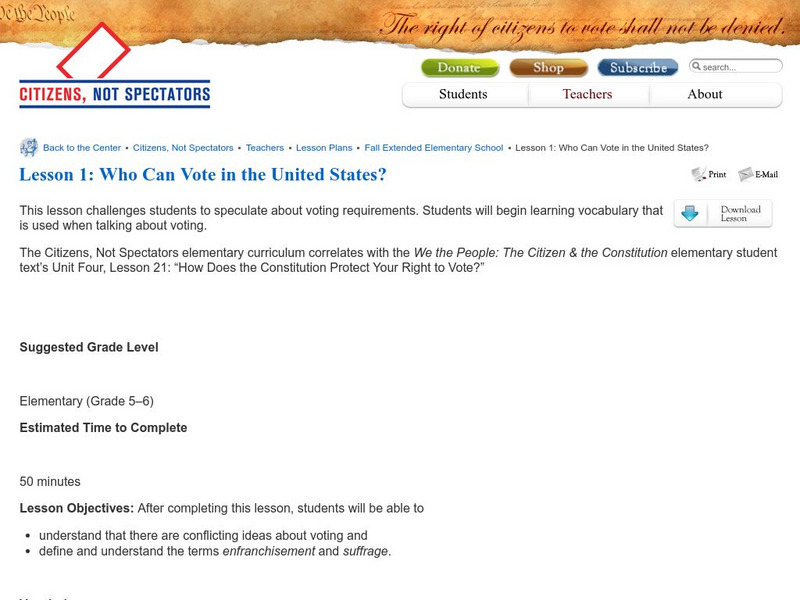Center For Civic Education
Center for Civic Education: Who Can Vote in the United States?
This lesson challenges students to speculate about voting requirements. Students will begin learning vocabulary that is used when talking about voting.
Center For Civic Education
Center for Civic Education: Becoming a Voter
In this lesson, students apply their state's requirements for registering to vote. Students learn when and how to register, how to complete a voter registration form, and when and how to reregister.
Center For Civic Education
Center for Civic Education: Becoming a Voter
In this lesson, students apply their state's requirements for registering to vote. Students learn when and how to register, how to complete a voter registration form, and when and how to reregister.
Center For Civic Education
Center for Civic Education: The Ballot and Questions
This lesson focuses on a voter's need to be fully informed prior to casting a vote on Election Day and how to acquire the necessary information.
iCivics
I Civics: Elk v. Wilkins (1884)
This mini-instructional activity examines the Supreme Court's ruling that the 14th Amendment's Citizenship Clause did not apply to American Indians born on Native reservations. Students analyze a primary document and discover how the...
iCivics
I Civics: Early Rebellions Mini Lesson
As a new country, the United States experienced a lot of growing pains. Discover some of the citizen-led rebellions that occurred in the nation's first decades, and how the government grew to respond.
iCivics
I Civics: Wanted: A Just Right Government
Look at the tensions and differences of opinion that existed among early American states and citizens. Learn about the Articles of Confederation, why the first "constitution" didn't work, and how compromise led to the Constitution.
iCivics
I Civics: Clapper v. Amnesty International (2013)
This mini-lesson covers the basics of the Supreme Court's decision that determined the government's ability to conduct electronic surveillance of its citizens. Students learn about the First Amendment right to free speech, the Fourth...
iCivics
I Civics: Judges: Playing Fair
This mini-lesson examines the role of fair and impartial courts in American life. Students learn a basic overview of the judiciary branch, including how judges are appointed and held accountable by citizens.
iCivics
I Civics: Constitution Day Lesson Plan
This interactive lesson gives students a quick snapshot of the Constitution, including the purpose of each article, the powers of the three branches, how a bill becomes a law, and the concepts of separation of powers and checks and...
iCivics
I Civics: Obergefell v. Hodges (2015)
This mini-lesson covers the basics of the Supreme Court's decision that extended marriage rights to same-sex couples. Young scholars learn about the 14th Amendment's Equal Protection and Due Process Clauses, and how the Court's...
PBS
Pbs Learning Media: Your America: Democracy's Local Heroes: Teacher's Guide
Inspire civic awareness, promote student activism and examine the rights and responsibilities of American citizenship by exploring stories of how ordinary citizens accomplished extraordinary changes.
PBS
Pbs Teachers: Active Citizenship: Civil Rights Work of Bob Moses (Lesson Plan)
A lesson that compares and contrasts Bob Moses's fight for civil rights in the 1960s with his continuing efforts to gain educational opportunities for the poor and for minorities. The lesson includes instructions for directing pupils to...
Alabama Learning Exchange
Alex: Why Vote?
Learners will complete a web quest that includes reading material on the expansion of voting rights, viewing video on historical events related to suffrage, and completing a multimedia project (public service announcement). An extension...
HotChalk
Hot Chalk: Lesson Plans Page: Do Something: Why Do I Have to Do Jury Duty?
This lesson plan has students acting out and discussing the jury duty process.
HotChalk
Hot Chalk: Lesson Plans Page: A Rights vs. Responsibilities Game
Directions for a dominos game. The teacher, before class or with students' help, creates dominos depicting various occasions. Students identify the responsibilities they would have for each occasion. Then students can use the pieces to...
ReadWriteThink
Read Write Think: Voting! What?s It All About?
Contains plans for an eight-lesson plan cross-curricular unit that uses the history of voting to teach reading and research skills. In addition to objectives and standards, this instructional plan contains links to sites used in the...








